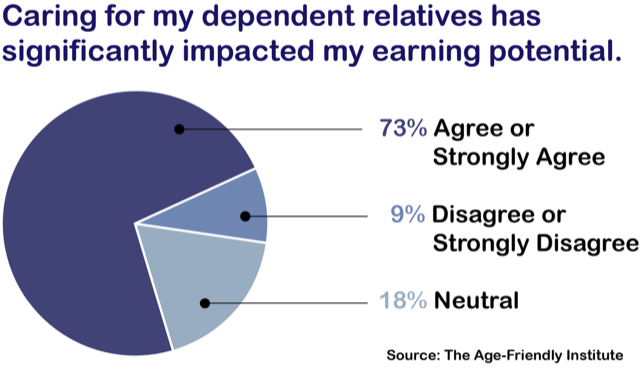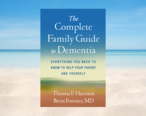Costs and Considerations for In-Home Elder Caregiving
As the population ages, the question of how to provide care to older adults is increasingly on people's minds. Whether the best care is provided at home by loved ones or professional care providers is a question many struggle with. If the choice is made to care for loved ones at home, what is the financial and emotional impact?

Sponsored Message: Mature Caregivers provides direct service in Massachusetts, and makes referrals in other states to vetted providers. Call 888-320-6700.
The Age-Friendly Institute surveyed a nationally representative sample of age 50+ adults via AgeFriendly.com regarding how they are coping with these challenges. Over 50% say they are caring for a spouse/partner, a parent or other adult relative, mostly in their own homes. A whopping 3 out of 4 survey respondents, now retired, say they left their job to care for their loved one or that it significantly contributed to that choice. Of those who are still working part-time, all reduced their work hours to make time to care for their loved one.

The financial impact of such a decision can be life changing. 85% say they are not compensated in any way for providing care averaging 40+ hours per week, and 70% say that providing care has significantly impacted their earning potential.
Caregivers are faced with reconciling the wishes of their loved ones and the potential cost of professional caregivers with what they would potentially make at a job. According to a recent Genworth Cost of Care Survey, the national average monthly cost of adult day care tops $2,000 and a full-time home health aide is over $6,000. That would mean, to pay for a home health aide, a job would need to pay in excess of $75,000 a year after taxes. In the next ten years, that cost could increase to over $100,000 per year.
The choice may be easier to make for someone who is old enough to rely on social security as an income stream while providing care. Yet this subset of people may also have health challenges of their own to contend with.
When asked whether they considered other options to providing care to their loved ones at home on their own, answers reflected the complexity involved:
- “No, I never considered anything else. My choice was easy. When you love someone, you want to help and do whatever needs to be done. I would not trade our time together for anything (even loss of income and job).”
- “I have considered other options, but have not been able to find any assistance that they qualify for.”
- “The considerations boil down to financial resources. Our family does not have the resources to sustain caregiving outside of the home or a non-family member.”
Though the personal and financial reasons for many to care for their loved ones at home are compelling, the impact on day-to-day life is significant. Participants said:
- “My day-to-day life has been impacted tremendously. I am happy to be able to assist but having no help is isolating in some ways. Also, finding remote work is MUCH more difficult than I thought it would be.”
- “Greatly reduced social time, rest and recreation, educational opportunities (goals foregone.) I need to be very conservative with finances.”
- “It was a big change to my independent life but has become a blessing. I am doing things I didn't realize I was capable of doing, and feeling fulfilled as if this was meant to be or was missing from my life.”
If I no longer needed to provide care at home, I would return to work either part time or full time.
When asked what they are planning for their own care when/if this is required, over 50% of participants say they don’t have a plan. Small numbers say they will be relying on family to care for them in their own home (15%) or their family’s homes (10%) or say they will live in assisted living (12%). Only 8.6% said they have or plan to purchase long term care insurance.
There are no perfect choices or easy solutions when it comes to the welfare of older loved ones. Providing care at home takes a financial, physical and emotional toll. Typically, there is not nearly enough conversation about how to help them. Understanding wishes, planning for the future and patience are important when faced with such challenges. Focusing on the positives of spending more time with loved ones and the ability to give back can help. Seeking support where resources are available and prioritizing the health and wellbeing of the caregiver are critical in providing quality long or short-term care.
In-Home Care Agency Or Privately-Hired Aides? When outsourcing care, choosing between a privately-compensated home care aide and an in-home care agency comes with its own challenges. Agencies have an additional recruiting, training and management cost, but prevent headaches and hidden dangers. Elder care consultants, also known as Aging Life Care Professionals, warn that there can be implications when families hire independent caregivers. Patricia Hanson, a Licensed Professional Counselor (LPC) with IKOR of Western Pennsylvania, shares the following advice with clients:
- Quality of Care and Supervision. At the heart of the matter is the quality of care. Non-licensed agencies may not have the obligation to meet established standards or ensure their staff are adequately trained. This could lead to subpar care, potentially harming those we aim to protect.
- Legal and Financial Liability. Hiring from a non-licensed agency can lead to significant legal and financial headaches if something goes wrong. If a caregiver causes harm, the responsibility might fall not just on the agency but also on the individual who hired them. This can lead to lawsuits and financial burdens no one wants to face.
- Insurance Implications. Engaging non-licensed providers might leave you without coverage from standard insurance policies. This gap can result in hefty out-of-pocket costs if legal issues arise, a risk many would prefer to avoid.
- Regulatory Compliance. Licensed agencies operate within a framework of state and federal regulations, covering everything from patient safety to privacy. Non-licensed providers may not adhere to these standards, opening up a can of legal worms.
- Ethical Considerations: It’s about doing what’s best for those in our care. Recommending reliable, safe services of known quality is not just good practice; it’s a moral imperative.
- Tax Deductions and Financial Benefits. There are tangible financial advantages to using licensed providers, from potential tax deductions for medical expenses to eligibility for certain tax credits and insurance benefits. These can add up to substantial savings and peace of mind.
It is also not uncommon for a caregiver to seek back pay and legal penalties for unpaid overtime. If a caregiver gets hurt on the job, a workers compensation claim can be costly unwanted surprise, whereas an in-home elder agency would normally bear this burden.
The Age-Friendly Institute surveyed a nationally representative sample of older adults aged 50+ in March 2024. There were 131 respondents.














There are no comments for this article yet. Be the first to leave a comment